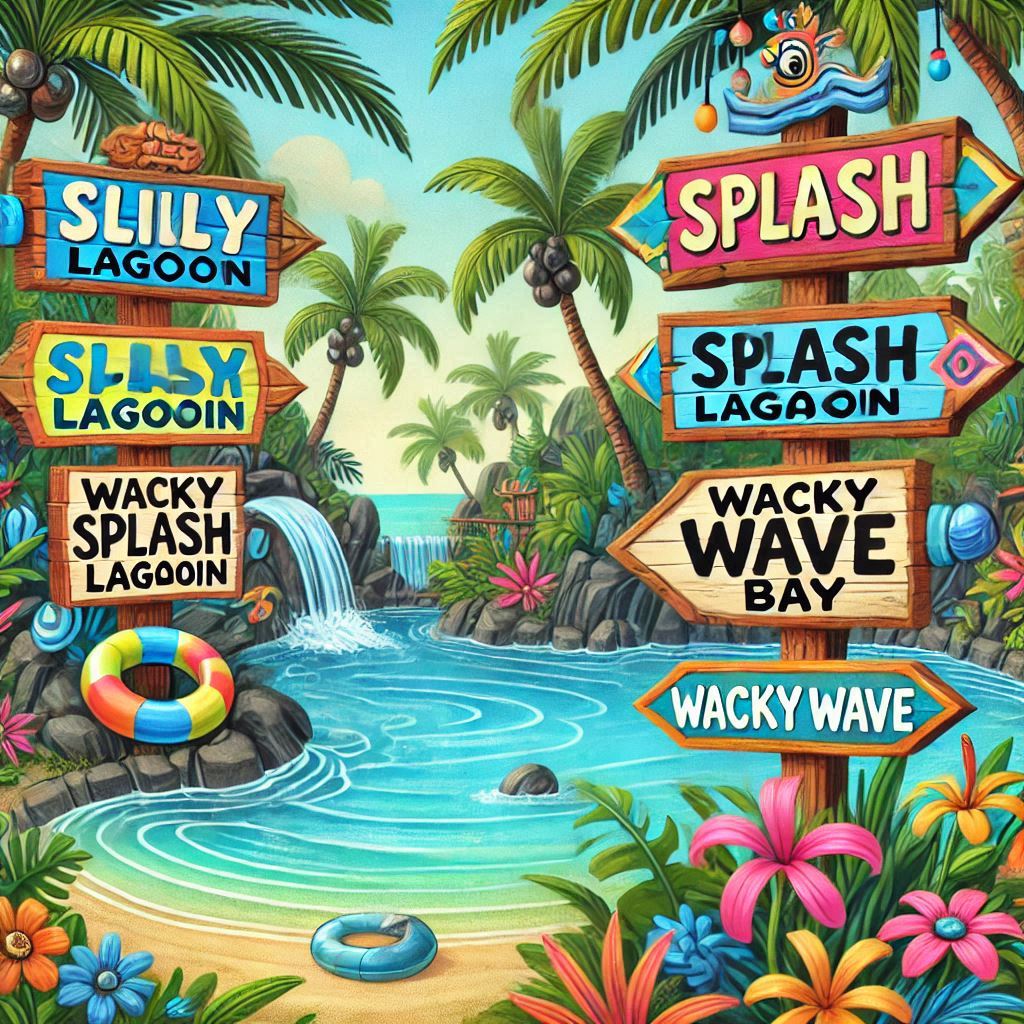Lagoon names. Two words that, on their own, seem rather mundane. Yet, when combined, they unlock a portal to a world of whimsy, absurdity, and downright hilarity. From the subtly suggestive to the blatantly bizarre, lagoon names around the globe offer a glimpse into the local culture, the quirky humor of mapmakers, and sometimes, just plain old silliness. This exploration delves into the fascinating phenomenon of funny lagoon names, examining their origins, the types of humor employed, and the sheer joy they bring to those who stumble upon them. Prepare to embark on a journey through the watery world of witty wordplay, where puns, innuendo, and the occasional dose of the ridiculous reign supreme.

A Splash of History: How Did We Get Here?
The naming of geographical features, including lagoons, is a practice as old as humanity itself. Early names often reflected the practical – a description of the lagoon’s shape, its location, or its primary inhabitants (both human and animal). Think “Horseshoe Lagoon” or “Fisherman’s Cove.” These names served a clear purpose: to identify and differentiate one body of water from another. However, as communities grew and language evolved, a touch of humor began to seep into the nomenclature. Perhaps it was a way to lighten the mood, to poke fun at local characters, or simply to add a memorable twist to an otherwise ordinary landmark. Whatever the reason, the tradition of funny lagoon names took root, and it continues to flourish to this day.
The Anatomy of a Funny Lagoon Name: Decoding the Humor
So, what makes a lagoon name funny? The answer, of course, is subjective and depends on individual tastes and cultural context. However, several common themes and techniques emerge when examining the world of humorous lagoon nomenclature.
- Puns and Wordplay: This is a classic form of humor, and lagoon names are no exception. Puns exploit the multiple meanings of words or the similarity in sound between different words to create a humorous effect. Imagine stumbling upon a lagoon called “Carp Diem” or “Fin-tastic Bay.” The clever wordplay adds a layer of amusement to an otherwise straightforward name.
- Descriptive Irony: Sometimes, the humor lies in the stark contrast between the name and the actual appearance of the lagoon. A “Crystal Clear Lagoon” that’s actually murky brown or a “Serene Cove” constantly battered by waves provides a delightful dose of ironic humor.
- Local Legends and Folklore: Many funny lagoon names are rooted in local stories, myths, or anecdotes. Perhaps a lagoon is named after a legendary fisherman known for his tall tales, or maybe it’s associated with a humorous event in the town’s history. These names not only provide a chuckle but also offer a glimpse into the community’s cultural heritage.
- Innuendo and Suggestion: While perhaps a bit risqué, innuendo and suggestive names are surprisingly common in the world of lagoon nomenclature. These names often rely on double entendres or subtle hints to create a humorous effect. Think of a lagoon shaped like a crescent moon being dubbed “Honeymoon Bay” or a secluded cove known as “Lovers’ Retreat.”
- Straight-Up Absurdity: And then there are the names that defy all explanation, the ones that are simply bizarre and nonsensical. These names often evoke a sense of bewilderment and amusement, leaving visitors wondering, “How did this lagoon get that name?” Perhaps it’s a “Rubber Ducky Lagoon” or a “Pickle Point Pond.” The sheer absurdity of these names is often the source of their humor.
A World Tour of Wacky Waters: Lagoon Names from Around the Globe
The phenomenon of funny lagoon names is not confined to any one particular region. From the sun-drenched shores of the Caribbean to the rugged coastlines of the North Atlantic, humorous lagoon names can be found in every corner of the globe.
- The Americas: The United States, with its vast network of lakes and lagoons, boasts a plethora of amusing names. “Whooping Crane Lagoon” in Texas, “Dead Man’s Lake” in California, and “Loon Lake” in Minnesota offer just a taste of the humorous nomenclature found across the country. Further south, in the Caribbean, the influence of pirate lore and seafaring traditions often leads to colorful and comical names.
- Europe: Across the Atlantic, Europe also has its fair share of funny lagoon names. From the quirky names of the Scottish lochs to the amusing appellations of the Mediterranean lagoons, the continent offers a delightful array of humorous bodies of water.From the amusing names of Australian billabongs to the comical appellations of the Pacific Islands, the region is rife with witty wordplay and humorous descriptions.
- Africa: The vast landscapes and diverse wildlife of Africa provide fertile ground for imaginative lagoon names. From the humorous names of the watering holes in the Serengeti to the comical appellations of the coastal lagoons, the continent offers a glimpse into the unique blend of humor and local culture.
The Psychology of Laughter: Why Funny Lagoon Names Resonate
The enduring popularity of funny lagoon names speaks to a fundamental human need for humor and amusement. Laughter is a universal language, a way to connect with others, to relieve stress, and to find joy in the world around us. Funny lagoon names, in their own small way, contribute to this shared experience of laughter. They offer a brief moment of levity, a chance to chuckle at the absurdity of life, and a reminder that even the most mundane aspects of our world can be a source of amusement.
The Power of Place: How Names Shape Our Perceptions
Names have a profound impact on how we perceive the world around us. They can evoke emotions, conjure images, and shape our understanding of a place. Funny lagoon names, in particular, have the power to transform an ordinary body of water into something memorable and engaging. They add a layer of personality to the landscape, making it more approachable and inviting. A lagoon with a funny name is more likely to capture our attention, spark our curiosity, and leave a lasting impression.
**Preserving the Humor: The Importance of Lagoon These names are not just words on a map; they are a reflection of local history, folklore, and humor. They represent the creativity and wit of past generations, and they deserve to be cherished and protected. By preserving these names, we ensure that future generations can continue to enjoy the laughter and insights they provide.
The Future of Funny Lagoon Names: Will the Humor Endure?
As long as humans have a sense of humor, the tradition of funny lagoon names is likely to endure. New lagoons will be discovered, new stories will be told, and new generations will find creative ways to express their wit and amusement. The world of funny lagoon names is constantly evolving, reflecting the changing times and the ever-shifting nature of humor.
Table of Examples:
| Lagoon Name | Location | Type of Humor |
|---|---|---|
| Whooping Crane Lagoon | Texas, USA | Descriptive |
| Carp Diem | Unknown | Pun |
| Dead Man’s Lake | California, USA | Descriptive/Ironic |
| Honeymoon Bay | Various | Innuendo |
| Rubber Ducky Lagoon | Unknown | Absurd |
| Loch Ness | Scotland | Myth/Legend |
Conclusion:
Funny lagoon names offer a delightful glimpse into the quirky side of geography. From puns and innuendo to straight-up absurdity, these names reflect the humor and creativity of local cultures around the world. Preserving these names is vital for safeguarding a unique aspect of our cultural heritage and ensuring that future generations can enjoy the laughter they evoke. So, the next time you encounter a lagoon with a funny name, take a moment to appreciate the wit and whimsy behind it.
FAQs:
- Q: How are lagoon names chosen? A: The process varies depending on the location. Often, local authorities, residents, or historical societies are involved in the naming process.
- Q: Are there rules about naming lagoons? A: In some areas, there may be guidelines or regulations regarding the naming of geographical features.
- Q: Can I suggest a name for a lagoon? A: In many cases, yes! Contact your local authorities or relevant organizations to inquire about the process.






